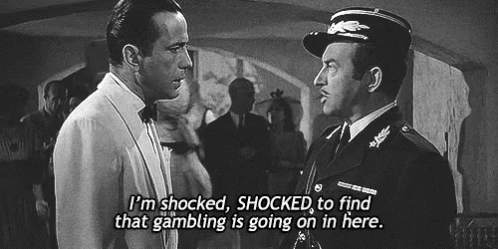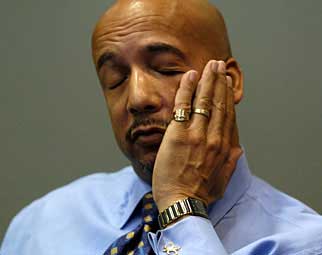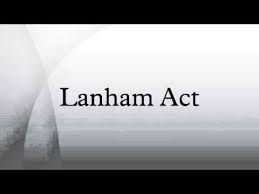 While finding a “clear record of delay or contumacious conduct,” sufficient to justify dismissal with prejudice in a Deepwater Horizon case, as to one set of appellants in Graham v. BP Exploration, the Fifth Circuit declined to do so as to the other group: “Confused about whether their three existing complaints were ‘individual lawsuits’ under [Pretrial Order] 63, the D’Amico Appellants queried the [Plaintiffs’ Steering Committee] and were advised only to file sworn statements.
While finding a “clear record of delay or contumacious conduct,” sufficient to justify dismissal with prejudice in a Deepwater Horizon case, as to one set of appellants in Graham v. BP Exploration, the Fifth Circuit declined to do so as to the other group: “Confused about whether their three existing complaints were ‘individual lawsuits’ under [Pretrial Order] 63, the D’Amico Appellants queried the [Plaintiffs’ Steering Committee] and were advised only to file sworn statements.  This was a mistake, as the D’Amico Appellants concede. But based on this flawed understanding of PTO 63, the D’Amico Appellants then timely filed and served sworn statements before the April 12, 2017 deadline. None of this makes those filings any less mistaken under PTO 63, but it does show an absence of willful conduct. And BP points to nothing in the record to dispel that impression. There is a critical difference between trying but failing, on the one hand, and simply not trying, on the other.” No. 18-30008 (Apr. 29, 2019) (emphasis added).
This was a mistake, as the D’Amico Appellants concede. But based on this flawed understanding of PTO 63, the D’Amico Appellants then timely filed and served sworn statements before the April 12, 2017 deadline. None of this makes those filings any less mistaken under PTO 63, but it does show an absence of willful conduct. And BP points to nothing in the record to dispel that impression. There is a critical difference between trying but failing, on the one hand, and simply not trying, on the other.” No. 18-30008 (Apr. 29, 2019) (emphasis added).
Monthly Archives: April 2019
 The Texas anti-SLAPP statute has generated an enormous amount of litigation and commentary, especially with the Legislature in session and actively considering amendments. Interestingly, one of the most successful defendants to invoke this statute is President Trump, who used it last year in California federal court to obtain dismissal of a defamation claim about the above Tweet, as well as a substantial award of attorneys’ fees. The district court’s opinion is interesting reading on the merits, as well on choice-of-law and the Ninth Circuit’s treatment of the underlying Erie issue.
The Texas anti-SLAPP statute has generated an enormous amount of litigation and commentary, especially with the Legislature in session and actively considering amendments. Interestingly, one of the most successful defendants to invoke this statute is President Trump, who used it last year in California federal court to obtain dismissal of a defamation claim about the above Tweet, as well as a substantial award of attorneys’ fees. The district court’s opinion is interesting reading on the merits, as well on choice-of-law and the Ninth Circuit’s treatment of the underlying Erie issue.
 An arbitration panel, organized under the rules of the Houston Bar Association, awarded a substantial sum to an attorney in a fee dispute with his former client. The client sought vacatur on the ground that it not know the non-attorney member of the panel worked for a large law firm (to paraphrase Claude Rains’s character in Casablanca, it was shocked, SHOCKED to make this discovery). The Fifth Circuit found this argument waived, and did not accept the client’s argument that waiver should be limited to vacatur based on conflicts of interest: “We therefore conclude that Light-Age waived its objection to Davis’s participation on the panel. Light-Age had constructive knowledge that Davis worked for a law firm at the time of the arbitration hearing; it could have discovered that Jackson Walker was a law firm simply by clicking on the link provided in Davis’s email signature or running a brief internet search. It is reasonable to expect even a pro se litigant to perform such basic research into its arbitrator.” Ashcroft-Smith v. Light-Age, Inc., No. 18-20098 (April 25, 2019) (emphasis added).
An arbitration panel, organized under the rules of the Houston Bar Association, awarded a substantial sum to an attorney in a fee dispute with his former client. The client sought vacatur on the ground that it not know the non-attorney member of the panel worked for a large law firm (to paraphrase Claude Rains’s character in Casablanca, it was shocked, SHOCKED to make this discovery). The Fifth Circuit found this argument waived, and did not accept the client’s argument that waiver should be limited to vacatur based on conflicts of interest: “We therefore conclude that Light-Age waived its objection to Davis’s participation on the panel. Light-Age had constructive knowledge that Davis worked for a law firm at the time of the arbitration hearing; it could have discovered that Jackson Walker was a law firm simply by clicking on the link provided in Davis’s email signature or running a brief internet search. It is reasonable to expect even a pro se litigant to perform such basic research into its arbitrator.” Ashcroft-Smith v. Light-Age, Inc., No. 18-20098 (April 25, 2019) (emphasis added).
 Counterclaims that “revolve around the parties’ compliance with the same settlement agreement” are compulsory under Fed. R. Civ. P. 13(a): “[B]oth regard the same instruments and transactions, and a jury would hear substantially the same facts in regard to both.” RPV, Ltd. v. Netsphere, Inc., No. 18-10462 (April 23, 2019) (unpublished) (citation omitted).
Counterclaims that “revolve around the parties’ compliance with the same settlement agreement” are compulsory under Fed. R. Civ. P. 13(a): “[B]oth regard the same instruments and transactions, and a jury would hear substantially the same facts in regard to both.” RPV, Ltd. v. Netsphere, Inc., No. 18-10462 (April 23, 2019) (unpublished) (citation omitted).
 Hira, a guarantor, argued that the lender’s calculation of the amount due should not have been accepted as a basis for summary judgment against her. The Fifth Circuit disagreed:
Hira, a guarantor, argued that the lender’s calculation of the amount due should not have been accepted as a basis for summary judgment against her. The Fifth Circuit disagreed:
Hira never proposed her own calculations, a step she was required to take by Texas law and the district court’s summary judgment order. RBC Real Estate Fin. v. Partners Land Dev., Ltd.543 F. App’x 477, 480 (5th Cir. 2013) (per curiam) (unpublished) (upholding a grant of summary judgment because the appellants “did not provide any controverting summary judgment evidence to the district court”); 8920 Corp. v. Alief Alamo Bank, 722 S.W.2d 718, 720 (Tex. App.—Houston [14th Dist.] 1986, writ ref’d n.r.e.) (granting a motion for summary judgement because the appellants “presented no controverting affidavits that could raise a fact issue as to appellee’s method of computation and the accuracy of its figures.”). Without providing a competing calculation, Hira failed to raise a genuine issue of material fact.
Pacific Premier Bank v. Hira, No. 18-10611 (April 15, 2019, unpublished).
 In a forum dispute arising from an oil-rig explosion, the Fifth Circuit rejected four arguments for personal jurisdiction in Texas over one of the parties, arising from that party’s litigation activity:
In a forum dispute arising from an oil-rig explosion, the Fifth Circuit rejected four arguments for personal jurisdiction in Texas over one of the parties, arising from that party’s litigation activity:
- Counterclaiming. “[A] non-resident defendant may participate in litigation without submitting to the court’s jurisdiction so long as it maintains its objection to personal jurisdiction. Relatedly, this court has also held that filing a counterclaim or ‘third-party claim does not, without more, waive an objection to personal jurisdiction.'” (citation and footnote omitted);
- Moving to compel arbitration. “Ironshore submitted to the court’s jurisdiction for the sole purpose of compelling arbitration. By submitting to the court’s power for this limited purpose and maintaining its personal jurisdiction motion to dismiss, Ironshore continued to object to ‘the power of the court’ and did not waive its personal jurisdiction defense.”
- Demand letters. “Many other circuits have addressed similar scenarios in which a potential plaintiff sends a cease-and-desist letter threatening litigation to a potential defendant. None of these courts held that sending a letter amounts to
purposeful availment.” - Settlement agreement with Texas forum clause. “There are no allegations of suit-related contact between Ironshore and Texas other than Ironshore’s
participation as a defendant in litigation and the forum-selection clause in the
settlement agreement . . . .”
Halliburton Energy Services, Inc. v. Ironshore Specialty Ins. Co., No. 17-20678 (April 17, 2019).
 Texas’s robust attorney-immunity doctrine defeated claims about the Allen Stanford scheme in Troice v. Greenberg Traurig LLP., No. 17-11464 (April 17, 2019). The Fifth Circuit declined to certify the state-law issue, citing “the substantial treatment of the issues by the Texas courts of appeals and the ‘cogent and sound arguments’ presented by counsel,” and held:
Texas’s robust attorney-immunity doctrine defeated claims about the Allen Stanford scheme in Troice v. Greenberg Traurig LLP., No. 17-11464 (April 17, 2019). The Fifth Circuit declined to certify the state-law issue, citing “the substantial treatment of the issues by the Texas courts of appeals and the ‘cogent and sound arguments’ presented by counsel,” and held:
- “We are persuaded the Supreme Court of Texas would apply the attorney immunity doctrine in the non-litigation context”;
- “[I]mmunity can apply even to criminal acts so long as the attorney was acting within the scope of representation” (noting that “[a]fter arguing there was a categorical bar to applying immunity in this context, the plaintiffs did not make an alternative argument that immunity does not apply because Greenberg’s acts were outside the scope of client representation”; and
- “We conclude that the Supreme Court of Texas would not consider itself sure that the Texas Legislature intended to abrogate attorney immunity in the context of [Texas Securities Act] claims.” (emphasis in original).
 A state prison, whose officers were sued for allegedly using excessive force, made video recordings of encounters with prisoners to defend against such claims. Unfortunately for the prison, in Bourne v. Gunnels the prisoner “had turned out the lights in the cell” and one of the defendants “stood in the doorway to the cell for most of the use of force,” meaning that from the video, “it is impossible to tell what occurred during the use of force.” This failure of proof led to reversal of summary judgment for the defendants. No. 17-20418 (April 16, 2019).
A state prison, whose officers were sued for allegedly using excessive force, made video recordings of encounters with prisoners to defend against such claims. Unfortunately for the prison, in Bourne v. Gunnels the prisoner “had turned out the lights in the cell” and one of the defendants “stood in the doorway to the cell for most of the use of force,” meaning that from the video, “it is impossible to tell what occurred during the use of force.” This failure of proof led to reversal of summary judgment for the defendants. No. 17-20418 (April 16, 2019).
 “In their Fourth Amended Complaint, the Bowmans make claims under the [Texas Debt Collection Act] without citing the appropriate sections of the statute for each claim. CitiMortgage raised this issue, and the Bowmans responded that they provided enough information for CitiMortgage to figure out which provisions it violated. As the district court reasoned, this is insufficient to provide fair notice to the defendant under Federal Rule of Civil Procedure 8(a).” Bowman v. CitiMortgage, No. 18-10867 (April 12, 2019) (unpublished).
“In their Fourth Amended Complaint, the Bowmans make claims under the [Texas Debt Collection Act] without citing the appropriate sections of the statute for each claim. CitiMortgage raised this issue, and the Bowmans responded that they provided enough information for CitiMortgage to figure out which provisions it violated. As the district court reasoned, this is insufficient to provide fair notice to the defendant under Federal Rule of Civil Procedure 8(a).” Bowman v. CitiMortgage, No. 18-10867 (April 12, 2019) (unpublished).
 The panel majority in Waste Management, Inc. v. River Birch, Inc.reversed a defense summary judgment in a civil RICO case, on the question whether an alleged bribe was the cause of an action by the disgraced former mayor Ray Nagin. The opinion detailed the circumstantial evidence both about the alleged bribe and its alleged effect, and found that a jury question had been presented: “Noting that It is rare in public bribery cases that there is definitive ‘smoking gun’ evidence to show a payment was made to an official to influence the official to perform some act—and there is no such evidence here. It is critical in cases such as this that inferences from circumstantial evidence about intent and motives about which reasonable minds could differ be sorted out by the jury.” (footnotes omitted). The dissent observed: “I don’t like granting summary judgment to campaign-finance violators. Nor do I like giving the benefit of the doubt to disgraced ex-government officials. But, in the absence of evidence, it’s what the law commands,” relying primarily on the Supreme Court’s Matsushita summary-judgment opinion. (Judge Davis wrote the majority opinion joined by Judge Costa; Judge Oldham dissented). A brief opinion on rehearing noted that the parties had not cited Matsushita so the court “therefore decline[s] to consider that case now.”
The panel majority in Waste Management, Inc. v. River Birch, Inc.reversed a defense summary judgment in a civil RICO case, on the question whether an alleged bribe was the cause of an action by the disgraced former mayor Ray Nagin. The opinion detailed the circumstantial evidence both about the alleged bribe and its alleged effect, and found that a jury question had been presented: “Noting that It is rare in public bribery cases that there is definitive ‘smoking gun’ evidence to show a payment was made to an official to influence the official to perform some act—and there is no such evidence here. It is critical in cases such as this that inferences from circumstantial evidence about intent and motives about which reasonable minds could differ be sorted out by the jury.” (footnotes omitted). The dissent observed: “I don’t like granting summary judgment to campaign-finance violators. Nor do I like giving the benefit of the doubt to disgraced ex-government officials. But, in the absence of evidence, it’s what the law commands,” relying primarily on the Supreme Court’s Matsushita summary-judgment opinion. (Judge Davis wrote the majority opinion joined by Judge Costa; Judge Oldham dissented). A brief opinion on rehearing noted that the parties had not cited Matsushita so the court “therefore decline[s] to consider that case now.”
 Fishback Nursery v. PNC Bank involved a lien dispute between two branches of creditors of a failed farm – the bank, and two nurseries who sold millions of dollars of trees and shrubs to the farm. That dispute turned on a choice-of-law analysis, as to which the Fifth Circuit observed:
Fishback Nursery v. PNC Bank involved a lien dispute between two branches of creditors of a failed farm – the bank, and two nurseries who sold millions of dollars of trees and shrubs to the farm. That dispute turned on a choice-of-law analysis, as to which the Fifth Circuit observed:
- It was fruitless for the nurseries to rely on choice-of-law provisions in contracts between them and the farm, as this dispute was between the nurseries and the bank, who was not involved in those contracts;
- Similarly, the nurseries barked up the wrong tree by relying upon a Restatement provision about contract disputes: “This case—as we have taken pains to emphasize—involves not a contractual dispute but rather a dispute over competing lien priorities in a bankrupt company’s assets. Analysis of choice-of-law in lien priority disputes begins, not with section 188, but with the ‘most significant relationship’ test in section 6.”
- And, that analysis is straightforward where Article 9 of Texas’s UCC has a specific provision about these disputes (that priority is determined by the law of the state where the agricultural products are located).
Finding that the district court’s analysis was well-rooted in these observations, the Court affirmed. No. 18-10090 (April 10, 2019).
 In a detailed (and remarkably readable) review of EPA regulations of water pollution by steam-electric power plants, the Fifth Circuit vacated and remanded a rule for further agency consideration. In a nutshell: “[F]or five of the six wastewater streams regulated by the final rule . . ., EPA affirmatively rejected surface impoundments as [“Best Available Technology”] ‘because [they] would not result in reasonable further progress toward eliminating the discharge of all pollutants, particularly toxic pollutants.’ And yet, having rejected impoundments as BAT because they would not achieve ‘reasonable further progress’ toward eliminating pollution from those streams, EPA turned around and chose impoundments as BAT for each of those same streams generated before the compliance date. That paradoxical action signals arbitrary and capricious agency action.” (emphasis added, citations omitted). Southwestern Elec. Power Co. v. EPA, No. 15-60821 (April 12, 2019).
In a detailed (and remarkably readable) review of EPA regulations of water pollution by steam-electric power plants, the Fifth Circuit vacated and remanded a rule for further agency consideration. In a nutshell: “[F]or five of the six wastewater streams regulated by the final rule . . ., EPA affirmatively rejected surface impoundments as [“Best Available Technology”] ‘because [they] would not result in reasonable further progress toward eliminating the discharge of all pollutants, particularly toxic pollutants.’ And yet, having rejected impoundments as BAT because they would not achieve ‘reasonable further progress’ toward eliminating pollution from those streams, EPA turned around and chose impoundments as BAT for each of those same streams generated before the compliance date. That paradoxical action signals arbitrary and capricious agency action.” (emphasis added, citations omitted). Southwestern Elec. Power Co. v. EPA, No. 15-60821 (April 12, 2019).
The losing party in Alonso v. Westcoast Corp., No. 17-30877 (Apr. 8, 2019), contended that it was plain error to submit the below jury question about a contract claim, without also asking whether the plaintiff had itself breached:
The Fifth Circuit held that it was not plain error, noting that earlier in the charge as part of the instructions, the jury had been told that if “one party to a contract substantially breaches the contract, then the breaching party cannot enforce the contract it has breached or demand damages form the other party to the contract.” The Court cited Baisden v. I’m Ready Prods., Inc., 693 F.3d 491, 506 (5th Cir. 2012), which allowed a question that “conflated the question of license (an affirmative defense . . . ) with that of infringement (a claim on which [plaintiff] carried the burden),” even though that question was “not a model of clarity.”
 This was a Louisiana case; by way of comparison (background only, given the deferential standard of review in this case), the Texas pattern charge on this point uses questions about both parties’ breach, drawing from Mustang Pipeline Co. v. Driver Pipeline Co., 134 S.W.3d 195 (Tex. 2004).
This was a Louisiana case; by way of comparison (background only, given the deferential standard of review in this case), the Texas pattern charge on this point uses questions about both parties’ breach, drawing from Mustang Pipeline Co. v. Driver Pipeline Co., 134 S.W.3d 195 (Tex. 2004).
 Fed. R. Civ. P. 8(c) requires parties to “affirmatively state any avoidance or affirmative defense.” Germain v. U.S. Bank applied that rule in a mortgage-servicing case, reasoning: “Germain alleged that the Defendants did not comply with § 1024.41. The Defendants denied this allegation, insisting that they had complied with that section. That is a denial or direct contradiction of Germain’s claim, not an affirmative defense. The Defendants did not expressly rely on § 1024.41(i) in their answer, but the use of § 1024.41(i) in their motion for summary judgment is merely an expansion of the denial in their answer.” No. 18-10508 (April 3, 2019). (“8c” also refers to an Alfa Romeo model, pictured above for general reference.)
Fed. R. Civ. P. 8(c) requires parties to “affirmatively state any avoidance or affirmative defense.” Germain v. U.S. Bank applied that rule in a mortgage-servicing case, reasoning: “Germain alleged that the Defendants did not comply with § 1024.41. The Defendants denied this allegation, insisting that they had complied with that section. That is a denial or direct contradiction of Germain’s claim, not an affirmative defense. The Defendants did not expressly rely on § 1024.41(i) in their answer, but the use of § 1024.41(i) in their motion for summary judgment is merely an expansion of the denial in their answer.” No. 18-10508 (April 3, 2019). (“8c” also refers to an Alfa Romeo model, pictured above for general reference.)
 Beckton Dickson & Co., a manufacturer of safety syringes, lost its antitrust claims against a competitor but prevailed on its Lanham Act claims, and sought the remedy of disgorgement. A panel majority concluded that:
Beckton Dickson & Co., a manufacturer of safety syringes, lost its antitrust claims against a competitor but prevailed on its Lanham Act claims, and sought the remedy of disgorgement. A panel majority concluded that:
[T]he district court did not abuse its discretion in determining that where [Defendant Retractable Technologies, Inc.] had not sufficiently demonstrated that its business suffered due to BD’s false advertising and where BD had already taken significant steps to correct the false statements, disgorgement was not equitable. That another court could have evaluated the facts differently does not justify reversal, especially as “an award of profits with no proof of harm is an uncommon remedy in a false advertising suit.”
The majority’s reasoning is best summarized by the final paragraph of its opinion, which observes:
The district court’s denial of disgorgement of profits from RTI’s competitor was made against the larger backdrop of its prosecution of a meritless antitrust claim against BD for conduct in the marketplace—during a time in which RTI nearly doubled its own sales and increased its share of the retractable syringe sub-market to two-thirds. RTI elected not to test its proof of Lanham Act damages before the jury, but rather to later argue, as now, that equity mandates disgorgement. Its effort to carry the flag of “public interest” and guide the profits of its competitor to its own coffers here must fail. That effort must be taken outside—to the marketplace. There the public interest is best vindicated.
A dissent thought that the district court had exceeded its mandate after a previous appeal. Retractable Technologies, Inc. v. Beckton Dickinson Inc., No. 17-40960 (March 26, 2019). Professor Rebecca Tushnet recently discussed the case on her 43(B) blog.
 The Tampa Bay Buccaneers football team sought recovery in BP’s Deepwater Horizon claims-processing system. It appealed to the Fifth Circuit, and requested that the courtroom be sealed for the oral argument. In a single-judge order, Judge Costa reviewed the general requirements about sealing, noted that it was the court’s decision and not the litigants’, and rejected the request: “As its right, Claimant ID 100246928 has used the federal courts in its attempt to obtain millions of dollars it believes BP owes because of the oil spill. But it should not able to benefit from this public resource while treating it like a private tribunal when there is no good reason to do so. On Monday, the public will be able to access the courtroom it pays for.” BP Exploration & Production v. Claimant ID 100246928, No. 18-30375 (March 29, 2019).
The Tampa Bay Buccaneers football team sought recovery in BP’s Deepwater Horizon claims-processing system. It appealed to the Fifth Circuit, and requested that the courtroom be sealed for the oral argument. In a single-judge order, Judge Costa reviewed the general requirements about sealing, noted that it was the court’s decision and not the litigants’, and rejected the request: “As its right, Claimant ID 100246928 has used the federal courts in its attempt to obtain millions of dollars it believes BP owes because of the oil spill. But it should not able to benefit from this public resource while treating it like a private tribunal when there is no good reason to do so. On Monday, the public will be able to access the courtroom it pays for.” BP Exploration & Production v. Claimant ID 100246928, No. 18-30375 (March 29, 2019).
 Emphasizing a significant difference between Texas and federal practice, ENI US Operating Co. v. Transocean clarified Circuit precedent and held: “Under [Fed. R. Civ. P.] 52(a), implicit findings will not automatically be inferred to support a conclusory ultimate finding. The district court must lay out enough subsidiary findings to allow us to glean ‘a clear understanding of the analytical process by which [the] ultimate findings were reached and to assure us that the trial court took care in ascertaining the facts.” Finding that the district court’s reasoning was insufficiently developed under this standard, the Fifth Circuit remanded for more detailed findings on a key point. The Court also reversed on two other issues of
Emphasizing a significant difference between Texas and federal practice, ENI US Operating Co. v. Transocean clarified Circuit precedent and held: “Under [Fed. R. Civ. P.] 52(a), implicit findings will not automatically be inferred to support a conclusory ultimate finding. The district court must lay out enough subsidiary findings to allow us to glean ‘a clear understanding of the analytical process by which [the] ultimate findings were reached and to assure us that the trial court took care in ascertaining the facts.” Finding that the district court’s reasoning was insufficiently developed under this standard, the Fifth Circuit remanded for more detailed findings on a key point. The Court also reversed on two other issues of  contract law:
contract law:
- A clause referring to an indemnity obligation for “special, indirect, or consequential damages,” while a “limitation on the type of damages allowed . . . says nothing about what type of claims can be brought” (and thus, does not preclude a breach-of-warranty action); and
- A damages calculation based on a steady contract price was flawed because “it looks to what Eni actually did
 after termination, when the operative question is what Eni would have done in a non-breach world. . . . The district court should have attempted to determine, in the hypothetical non-breach world, how many days the Pathfinder [above, left] would have spent at each applicable rate.”
after termination, when the operative question is what Eni would have done in a non-breach world. . . . The district court should have attempted to determine, in the hypothetical non-breach world, how many days the Pathfinder [above, left] would have spent at each applicable rate.”
No. 18-20115 (March 28, 2019).
